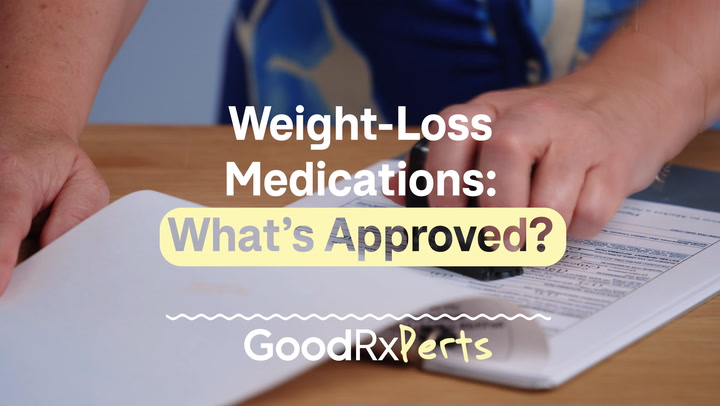
When Will Qsymia Start Working? (Plus 6 More FAQs About Taking Qsymia)
Key takeaways:
Qsymia (phentermine / topiramate ER) is an oral weight-loss medication. It’s one of the most effective oral options for weight loss. But it’s a controlled substance with a risk of dependence and misuse, so it may not be the best choice for everyone.
You should notice a change in your weight within the first 8 to 12 weeks after starting Qsymia. If you haven’t lost at least 5% of your body weight after 12 weeks of the highest dosage, Qsymia is likely not the right medication for you.
You should take Qsymia once daily in the morning. You can take it with or without food, but it’s best to limit caffeine and avoid alcohol to lower the chance of side effects.
There are ways to save on Qsymia. GoodRx can help you access Qsymia at an exclusive cash price of $149.10. A manufacturer savings card is also available.
Table of contents

Injectable weight-loss medications that are newer to the market, such as Wegovy (semaglutide), are getting a lot of attention lately. In turn, other weight-loss medications that have been around for much longer may be falling under the radar. But just because these medications aren’t as trendy today, doesn’t mean they might not be a good option to help you achieve your weight-loss goals.
Qsymia (phentermine / topiramate ER) is one such example. It’s an oral capsule that’s been proven effective for weight loss when combined with a reduced-calorie diet and exercise. And it’s one of the most effective options that doesn’t require an injection to work.
But what’s the best way to take Qsymia? And how long does it take to start working? Here, we’ll answer these and 5 more common questions about taking Qsymia.
1. How does Qsymia help you lose weight?
Qsymia combines two different medications to help you lose weight — phentermine and topiramate.
Phentermine is considered a stimulant medication. It seems to help with weight loss by decreasing your appetite and helping you eat less food. Phentermine is a controlled substance, which means it carries a risk for dependence and misuse. It’s also available on its own for weight loss under the brand names Adipex-P and Lomaira.
Topiramate is an anti-seizure medication. Like phentermine, it seems to lower your appetite and help you feel full with less food. But we don’t know for sure exactly how it works. Topiramate is also available on its own under the brand name Topamax. But it’s only approved to prevent migraine headaches and treat epilepsy. Weight loss is an off-label use of topiramate tablets.
How well does Qsymia work compared with other weight loss medications?
Qsymia seems to be the most effective oral weight-loss medication that’s currently available. In studies, about 70% of adults who took the maximum dose of Qsymia lost at least 5% of their body weight after 1 year. And about 50% of adults lost at least 10% of their body weight after 1 year.
But Qsymia may not be as effective as the newer injectable weight-loss medications. And since it’s a controlled substance, Qsymia may not be the right choice for everyone.
2. How long does it take for Qsymia to start working?
Qsymia starts working within a few hours of taking it. But weight loss occurs more gradually over time. In studies, significant weight loss was seen within the first 8 weeks of taking Qsymia.
Real stories: Wonder what it’s like to take Qsymia for weight loss? Read these first-hand accounts from people taking Qsymia.
Qsymia side effects: Have you noticed numbness or tingling after starting Qsymia? Learn more about potential Qsymia side effects and how to manage them.
Qsymia vs. Wegovy: Here’s how these two weight-loss medications compare.
After 12 weeks (3 months) of taking the recommended Qsymia dosage, your prescriber will likely take a look at how it's working for you. If you’ve lost at least 3% of your starting body weight and you’re tolerating the medication well, you’ll likely continue taking the same dose you started with.
But if you’ve lost less than 3% of your starting body weight, your prescriber may increase your dose to see if that works better for you. After another 12 weeks (3 months), if you’ve lost less than 5% of your starting body weight, Qsymia is probably not the right medication for you. Your prescriber can recommend a different option.
Keep in mind: Everyone responds differently to weight-loss medications. And although 8 to 12 weeks sounds like a long time to see results, slow, steady weight loss over time is the best way to achieve weight loss that sticks.

3. When is the best time to take Qsymia?
You should take Qsymia once a day in the morning. If you take it later in the day, it can cause insomnia due to its stimulant effect. You can take Qsymia with or without food. But if it makes you nauseated, taking it with food may help.
Qsymia is an extended-release capsule. That means the medication inside the capsule releases into your body over time after you take it. So you should always swallow it whole and never open or chew the capsule. Otherwise, you may receive an entire day’s worth of medication all at once.
You also shouldn’t stop taking Qsymia on your own. Seizures are possible if you stop taking it suddenly. Talk to your prescriber first if you’d like to stop taking Qsymia. They can provide directions for how to stop taking it safely.
4. What diet works best with Qsymia?
There isn’t a specific diet that’s recommended while you’re taking Qsymia. In general, it works best when you lower your daily calorie intake. But you should still make sure you’re eating a balanced diet to get the vitamins and nutrients you need to stay healthy.
There are several science-backed diets for weight loss. Examples include the DASH (Dietary Approaches to Stop Hypertension) diet, the Mediterranean diet, and intermittent fasting. Your prescriber may recommend a meal plan for you based on your other health conditions. But at the end of the day, the best meal plan is the one you’ll stick to and enjoy.
Good to know: Since Qsymia can have stimulant effects, it might be a good idea to limit your caffeine intake while you’re taking it. Too much caffeine can increase the risk of side effects, such as feeling jittery and anxious or having an increased heat rate.
5. How long can you take Qsymia?
There’s no set time for how long you can take Qsymia. Studies followed people taking Qsymia for a little over 2 years and found that long-term treatment seems safe and effective.
That being said, Qsymia doesn’t work for everyone. If you haven’t lost at least 5% of your body weight after 12 weeks on the highest recommended dosage, there’s not much reason to keep taking it. A different weight-loss medication may work better for you.
If you stop taking Qsymia, you may regain some or all of the weight you’ve lost. But if you choose to stop taking it, talk to your prescriber first. They can reduce your dose over time to help you stop taking it safely.
Does Qsymia stop working over time?
As mentioned, Qsymia is approved for long-term use. People continued to lose weight after taking Qsymia for more than 2 years. That being said, it’s common to hit a plateau when you’re taking weight-loss medication.
Changing up your exercise plan or paying close attention to your diet can help jump-start your weight loss. You can also talk to your prescriber to see if a higher Qsymia dosage or a different weight-loss medication is an option for you.
6. What are the side effects of Qsymia, and how can you prevent them?
The most common Qsymia side effects include:
Tingling or numbness in hands or feet
Dizziness
Loss of taste or taste changes
Insomnia
Constipation
Dry mouth
You’ll start with a low dose of Qsymia and gradually increase it to the desired dosage. This helps your body adjust to the medication and lowers the chance of side effects. But if they’re bothersome at any time, let your healthcare team know. They may want to lower your dose to help manage them.
More serious Qsymia side effects are also possible, but they’re not common. Examples include:
Dependence and misuse
Suicidal thoughts
Confusion or trouble thinking clearly
Kidney stones
Serious skin reactions
Decreased kidney function
Hyperthermia (increased body temperature)
Good to know: Qsymia can cause serious birth defects if you take it while you’re pregnant. The FDA’s Qsymia Risk Evaluation and Mitigation Strategy (REMS) program requires a negative pregnancy test before starting Qsymia and monthly negative tests during treatment if pregnancy is a possibility. You’re also required to use effective birth control consistently while taking it. Talk to your pharmacist or prescriber if you have questions about Qsymia and pregnancy.
Will Qsymia side effects go away?
Common Qsymia side effects, such as numbness, dizziness, and constipation, may improve as your body adjusts to the medication. This is one reason the dosage starts low and is slowly increased over time.
Keep in mind that it can take some time for Qsymia to start working. So it’s easy to become frustrated with side effects and a lack of weight loss during the first few weeks of taking it. But for most people, if you stick with the treatment plan, you’ll start feeling better and losing weight within about 8 weeks. But if your side effects worsen or don’t improve, let your prescriber know. A different medication may be a better option for you.
7. Can you drink alcohol while taking Qsymia?
It’s best to avoid alcohol while you’re taking Qsymia. The combination raises your risk for side effects, such as dizziness and confusion. Alcohol can also interfere with your weight-loss goals, as it’s high in calories and can lead to unhealthy food choices.
If you drink alcohol regularly, let your prescriber know before you start taking Qsymia. They can help you cut back safely, or they may decide a different weight-loss medication is a safer option for you.
If you or someone you know struggles with substance use, help is available. Call SAMHSA’s National Helpline at 1-800-662-4357 to learn about resources in your area.
How to save on Qsymia
There are ways to save on Qsymia, which is available as a brand-name medication. GoodRx can help you navigate between GoodRx coupons and copay savings cards to save money on your prescription.
Save with GoodRx: Anyone with a valid prescription, regardless of insurance status, can use GoodRx to purchase a 30-day supply of Qsymia at an exclusive cash price of $149.10.
Save with a copay savings card: If you have commercial insurance, you may be eligible to pay as little as $70 for Qsymia using a savings card from the manufacturer. A home-delivery program called Qsymia Engage is also available.
The bottom line
Qsymia (phentermine / topiramate) is an oral medication that’s FDA-approved for weight loss. It works best when combined with a reduced-calorie diet and exercise. And it’s one of the most effective oral weight-loss medications. But Qsymia is a controlled substance with a risk of dependence and misuse, so it’s not the best option for everyone.
You should notice weight loss within the first 8 to 12 weeks of starting Qsymia. But if you’ve lost less than 5% of your body weight after 12 weeks at the highest dosage, Qsymia may not be the right medication for you.
You should take Qsymia once daily in the morning, with or without food. It’s best to limit caffeine and avoid alcohol while you’re taking it. And effective birth control is required for the duration of treatment if pregnancy is possible for you. Common Qsymia side effects include dizziness, tingling hands and feet, and taste changes. You’ll start with a low dose and increase it over time to help lessen side effects.
Why trust our experts?



References
Lonneman, D. J., Jr., et al. (2013). Phentermine/topiramate extended-release capsules (Qsymia) for weight loss. Pharmacy and Therapeutics.
Qsymia. (n.d.). Risk Evaluation and Mitigation Strategy (REMS).
Sombra, L. R. S., et al. (2024). Pharmacologic therapy for obesity.
Vanattou-Saïfoudine, N., et al. (2012). Caffeine provokes adverse interactions with 3,4-methylenedioxymethamphetamine (MDMA, ‘ecstasy’) and related psychostimulants: Mechanisms and mediators. British Journal of Pharmacology.
Vivus. (2023). Qsymia - phentermine and topiramate capsule, extended release [package insert].
Was this page helpful?
Related Articles
Browse medications
View AllResearch prescriptions and over-the-counter medications from A to Z, compare drug prices, and start saving.






















